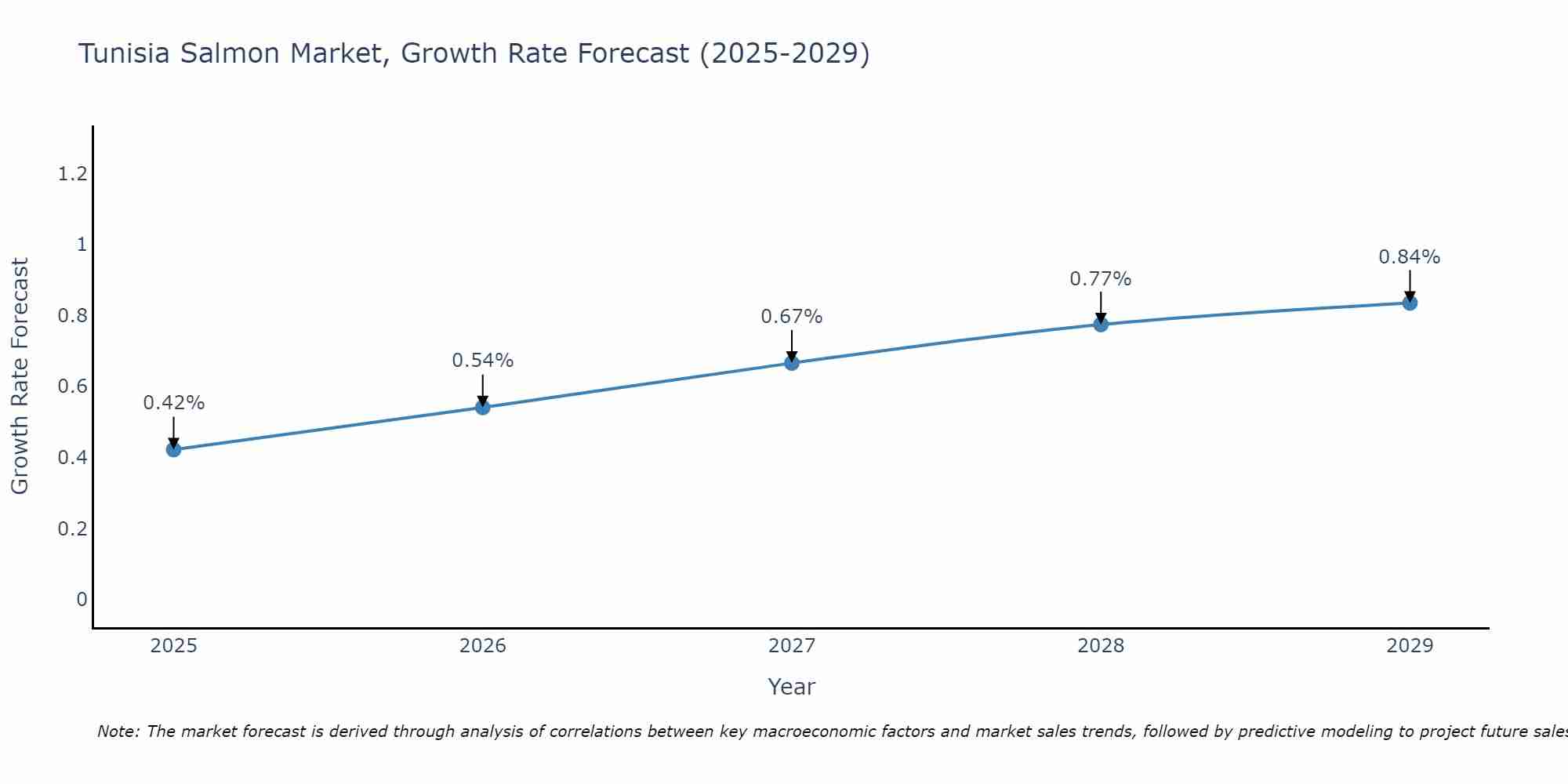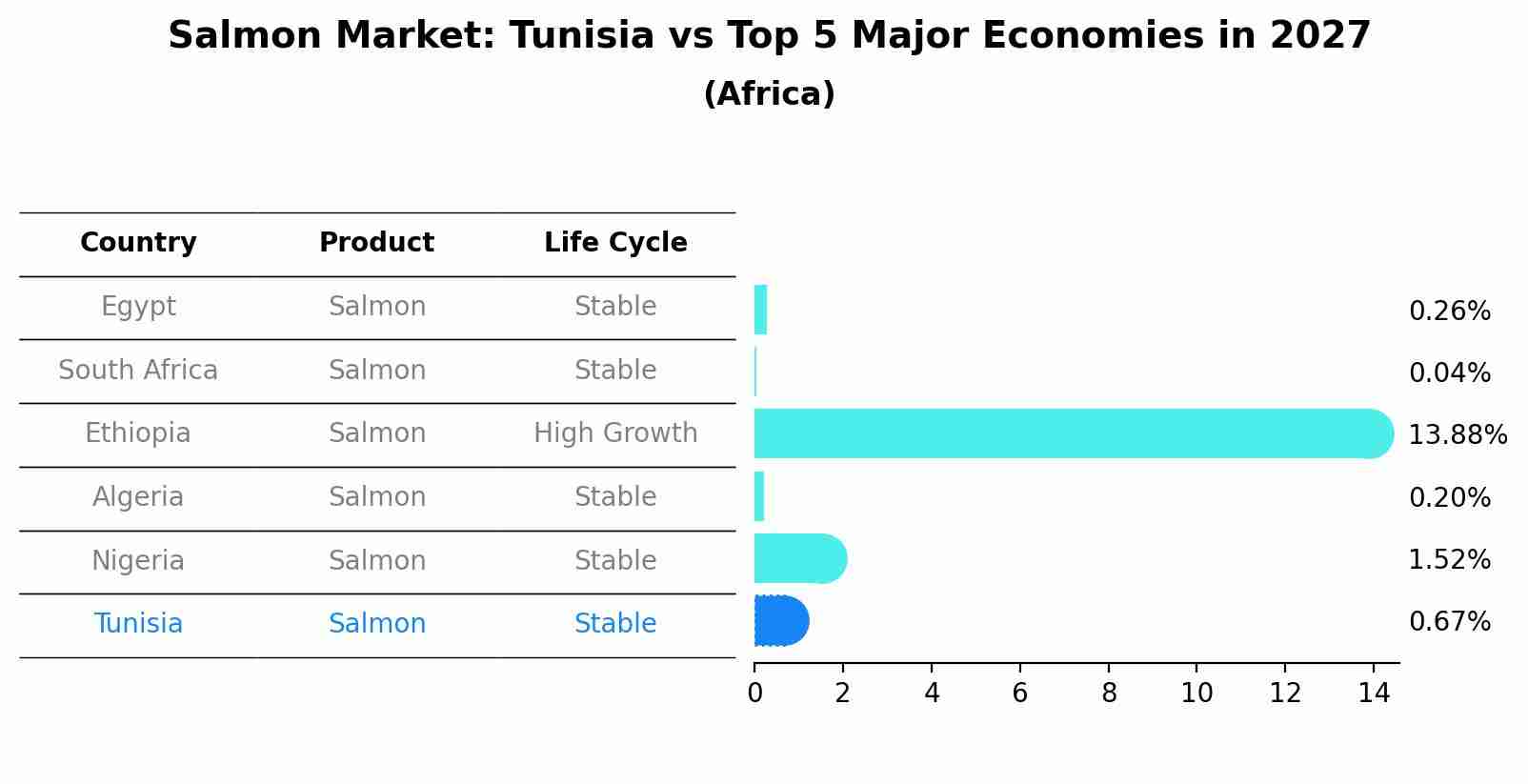Tunisia Salmon Market (2025-2031) Outlook | Trends, Industry, Companies, Share, Size, Analysis, Growth, Value, Revenue & Forecast
| Product Code: ETC387654 | Publication Date: Aug 2022 | Updated Date: Jul 2025 | Product Type: Market Research Report | |
| Publisher: 6Wresearch | Author: Sachin Kumar Rai | No. of Pages: 75 | No. of Figures: 35 | No. of Tables: 20 |
Tunisia Salmon Market Size Growth Rate
The Tunisia Salmon Market is likely to experience consistent growth rate gains over the period 2025 to 2029. The growth rate starts at 0.42% in 2025 and reaches 0.84% by 2029.

Salmon Market: Tunisia vs Top 5 Major Economies in 2027 (Africa)
Tunisia's Salmon market is anticipated to experience a stable growth rate of 0.67% by 2027, reflecting trends observed in the largest economy Egypt, followed by South Africa, Ethiopia, Algeria and Nigeria.

Tunisia Salmon Market Synopsis
The Tunisia salmon market is a niche segment within the country`s broader seafood industry, primarily catering to high-end restaurants, hotels, and specialty grocery stores. Despite being a relatively small market compared to other seafood products, the demand for salmon in Tunisia has been steadily increasing in recent years due to changing consumer preferences towards healthier and more diverse food options. Imported salmon dominates the market, with Norway being a key supplier. Local production of salmon is limited, mainly due to the lack of suitable aquaculture conditions. However, there is potential for growth in the Tunisia salmon market as awareness of the health benefits and versatility of salmon continues to rise among Tunisian consumers, presenting opportunities for both domestic and international seafood suppliers.
Tunisia Salmon Market Trends
The Tunisia Salmon Market is experiencing a growing demand for salmon products due to increasing consumer awareness of the health benefits associated with salmon consumption. There is a noticeable shift towards more sustainable and responsibly sourced salmon products, with consumers showing a preference for products that are certified as sustainable and environmentally friendly. Additionally, there is a rising interest in value-added salmon products such as smoked salmon, marinated salmon, and ready-to-eat salmon snacks, reflecting changing consumer preferences towards convenient and innovative food options. The market is also witnessing a trend towards online shopping for salmon products, driven by the convenience and accessibility of e-commerce platforms. Overall, the Tunisia Salmon Market is evolving to meet the changing preferences and demands of consumers for high-quality, sustainable, and convenient salmon products.
Tunisia Salmon Market Challenges
In the Tunisia Salmon Market, there are several challenges faced by industry players. One major challenge is the high import costs associated with bringing salmon into the country, which can drive up prices for consumers. Additionally, there may be issues with maintaining consistent quality and freshness of the salmon due to transportation and storage logistics. Another challenge is the relatively low awareness and consumption of salmon in Tunisia compared to other seafood options, which may require efforts in marketing and education to increase demand. Furthermore, competition from other seafood products and the presence of counterfeit or mislabeled salmon in the market can also pose challenges in building consumer trust and loyalty. Overall, navigating these challenges requires strategic planning and a deep understanding of consumer preferences and market dynamics.
Tunisia Salmon Market Investment Opportunities
The Tunisia Salmon Market presents promising investment opportunities due to the increasing demand for salmon in the country. As consumer preferences shift towards healthier and high-protein food options, the market for salmon is expanding. Investors can consider opportunities in salmon farming operations, processing facilities, distribution networks, and retail outlets to capitalize on this growing trend. With Tunisia`s strategic location for export to both European and African markets, there is potential for significant growth in the salmon industry. Additionally, advancements in technology and sustainable practices in salmon farming can further attract investors looking to participate in a lucrative and environmentally conscious sector. Conducting thorough market research and understanding consumer preferences will be essential for successful investment in the Tunisia Salmon Market.
Jordan Agar Market Government Policies
The Tunisian government has implemented various policies to regulate the salmon market in the country. These include strict quality control measures to ensure that imported salmon meets health and safety standards. The government also imposes tariffs and quotas on salmon imports to protect domestic producers and promote self-sufficiency in the industry. Additionally, there are regulations in place to monitor and regulate fishing practices to prevent overfishing and ensure sustainability. The government`s focus on these policies aims to balance the demand for salmon in Tunisia with the need to support local producers and safeguard the environment.
Tunisia Salmon Market Future Outlook
The future outlook for the Tunisia Salmon Market appears to be positive, with steady growth expected in the coming years. Factors such as increasing demand for high-quality seafood products, changing consumer preferences towards healthier options, and the growing popularity of salmon in Tunisian cuisine are likely to drive market expansion. Additionally, improvements in aquaculture practices and technology advancements are anticipated to enhance production efficiency and product quality. With a focus on sustainability and traceability becoming more important in the seafood industry, opportunities for premium and certified salmon products are likely to emerge in the Tunisian market. Overall, the Tunisia Salmon Market is poised for growth and development, with potential for increased market penetration and diversification of product offerings.
Key Highlights of the Report:
- Tunisia Salmon Market Outlook
- Market Size of Tunisia Salmon Market, 2024
- Forecast of Tunisia Salmon Market, 2031
- Historical Data and Forecast of Tunisia Salmon Revenues & Volume for the Period 2021 - 2031
- Tunisia Salmon Market Trend Evolution
- Tunisia Salmon Market Drivers and Challenges
- Tunisia Salmon Price Trends
- Tunisia Salmon Porter's Five Forces
- Tunisia Salmon Industry Life Cycle
- Historical Data and Forecast of Tunisia Salmon Market Revenues & Volume By Type for the Period 2021 - 2031
- Historical Data and Forecast of Tunisia Salmon Market Revenues & Volume By Chinook Salmon for the Period 2021 - 2031
- Historical Data and Forecast of Tunisia Salmon Market Revenues & Volume By Coho Salmon for the Period 2021 - 2031
- Historical Data and Forecast of Tunisia Salmon Market Revenues & Volume By Pink Salmon for the Period 2021 - 2031
- Historical Data and Forecast of Tunisia Salmon Market Revenues & Volume By Red Salmon for the Period 2021 - 2031
- Historical Data and Forecast of Tunisia Salmon Market Revenues & Volume By Salmo Salar for the Period 2021 - 2031
- Historical Data and Forecast of Tunisia Salmon Market Revenues & Volume By Silverbrite Salmon for the Period 2021 - 2031
- Historical Data and Forecast of Tunisia Salmon Market Revenues & Volume By End Product Type for the Period 2021 - 2031
- Historical Data and Forecast of Tunisia Salmon Market Revenues & Volume By Fresh for the Period 2021 - 2031
- Historical Data and Forecast of Tunisia Salmon Market Revenues & Volume By Frozen for the Period 2021 - 2031
- Historical Data and Forecast of Tunisia Salmon Market Revenues & Volume By Canned for the Period 2021 - 2031
- Historical Data and Forecast of Tunisia Salmon Market Revenues & Volume By Others for the Period 2021 - 2031
- Historical Data and Forecast of Tunisia Salmon Market Revenues & Volume By Distribution Channel for the Period 2021 - 2031
- Historical Data and Forecast of Tunisia Salmon Market Revenues & Volume By Retail Stores for the Period 2021 - 2031
- Historical Data and Forecast of Tunisia Salmon Market Revenues & Volume By Hypermarket/supermarket for the Period 2021 - 2031
- Historical Data and Forecast of Tunisia Salmon Market Revenues & Volume By Online Sales Channels for the Period 2021 - 2031
- Tunisia Salmon Import Export Trade Statistics
- Market Opportunity Assessment By Type
- Market Opportunity Assessment By End Product Type
- Market Opportunity Assessment By Distribution Channel
- Tunisia Salmon Top Companies Market Share
- Tunisia Salmon Competitive Benchmarking By Technical and Operational Parameters
- Tunisia Salmon Company Profiles
- Tunisia Salmon Key Strategic Recommendations
Frequently Asked Questions About the Market Study (FAQs):
- Single User License$ 1,995
- Department License$ 2,400
- Site License$ 3,120
- Global License$ 3,795
Search
Thought Leadership and Analyst Meet
Our Clients
Related Reports
- Canada Oil and Gas Market (2026-2032) | Share, Segmentation, Value, Industry, Trends, Forecast, Analysis, Size & Revenue, Growth, Competitive Landscape, Outlook, Companies
- Germany Breakfast Food Market (2026-2032) | Industry, Share, Growth, Size, Companies, Value, Analysis, Revenue, Trends, Forecast & Outlook
- Australia Briquette Market (2025-2031) | Growth, Size, Revenue, Forecast, Analysis, Trends, Value, Share, Industry & Companies
- Vietnam System Integrator Market (2025-2031) | Size, Companies, Analysis, Industry, Value, Forecast, Growth, Trends, Revenue & Share
- ASEAN and Thailand Brain Health Supplements Market (2025-2031) | Strategy, Consumer Insights, Analysis, Investment Trends, Opportunities, Growth, Size, Share, Industry, Revenue, Segments, Value, Segmentation, Supply, Forecast, Restraints, Outlook, Competition, Drivers, Trends, Demand, Pricing Analysis, Competitive, Strategic Insights, Companies, Challenges
- ASEAN Bearings Market (2025-2031) | Strategy, Consumer Insights, Analysis, Investment Trends, Opportunities, Growth, Size, Share, Industry, Revenue, Segments, Value, Segmentation, Supply, Forecast, Restraints, Outlook, Competition, Drivers, Trends, Demand, Pricing Analysis, Competitive, Strategic Insights, Companies, Challenges
- Europe Flooring Market (2025-2031) | Outlook, Share, Industry, Trends, Forecast, Companies, Revenue, Size, Analysis, Growth & Value
- Saudi Arabia Manlift Market (2025-2031) | Outlook, Size, Growth, Trends, Companies, Industry, Revenue, Value, Share, Forecast & Analysis
- Uganda Excavator, Crane, and Wheel Loaders Market (2025-2031) | Strategy, Consumer Insights, Analysis, Investment Trends, Opportunities, Growth, Size, Share, Industry, Revenue, Segments, Value, Segmentation, Supply, Forecast, Restraints, Outlook, Competition, Drivers, Trends, Demand, Pricing Analysis, Competitive, Strategic Insights, Companies, Challenges
- Rwanda Excavator, Crane, and Wheel Loaders Market (2025-2031) | Strategy, Consumer Insights, Analysis, Investment Trends, Opportunities, Growth, Size, Share, Industry, Revenue, Segments, Value, Segmentation, Supply, Forecast, Restraints, Outlook, Competition, Drivers, Trends, Demand, Pricing Analysis, Competitive, Strategic Insights, Companies, Challenges
Industry Events and Analyst Meet
Whitepaper
- Middle East & Africa Commercial Security Market Click here to view more.
- Middle East & Africa Fire Safety Systems & Equipment Market Click here to view more.
- GCC Drone Market Click here to view more.
- Middle East Lighting Fixture Market Click here to view more.
- GCC Physical & Perimeter Security Market Click here to view more.
6WResearch In News
- Doha a strategic location for EV manufacturing hub: IPA Qatar
- Demand for luxury TVs surging in the GCC, says Samsung
- Empowering Growth: The Thriving Journey of Bangladesh’s Cable Industry
- Demand for luxury TVs surging in the GCC, says Samsung
- Video call with a traditional healer? Once unthinkable, it’s now common in South Africa
- Intelligent Buildings To Smooth GCC’s Path To Net Zero


















